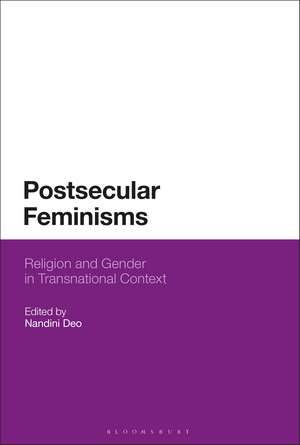Postsecular Feminisms: Religion and Gender in Transnational Context
Editat de Nandini Deoen Limba Engleză Paperback – 22 ian 2020
| Toate formatele și edițiile | Preț | Express |
|---|---|---|
| Paperback (1) | 224.03 lei 6-8 săpt. | |
| Bloomsbury Publishing – 22 ian 2020 | 224.03 lei 6-8 săpt. | |
| Hardback (1) | 715.08 lei 6-8 săpt. | |
| Bloomsbury Publishing – 25 iul 2018 | 715.08 lei 6-8 săpt. |
Preț: 224.03 lei
Preț vechi: 288.50 lei
-22% Nou
Puncte Express: 336
Preț estimativ în valută:
42.87€ • 44.76$ • 35.48£
42.87€ • 44.76$ • 35.48£
Carte tipărită la comandă
Livrare economică 04-18 aprilie
Preluare comenzi: 021 569.72.76
Specificații
ISBN-13: 9781350147881
ISBN-10: 1350147885
Pagini: 240
Dimensiuni: 156 x 234 mm
Greutate: 0.34 kg
Editura: Bloomsbury Publishing
Colecția Bloomsbury Academic
Locul publicării:London, United Kingdom
ISBN-10: 1350147885
Pagini: 240
Dimensiuni: 156 x 234 mm
Greutate: 0.34 kg
Editura: Bloomsbury Publishing
Colecția Bloomsbury Academic
Locul publicării:London, United Kingdom
Caracteristici
Transnational case studies show how religions, secularisms, feminisms, and postsecular feminisms operate on the ground in North America, South Asia, and West Africa
Notă biografică
Nandini Deo is Associate Professor of Political Science at Lehigh University, USA. She is the author of Mobilizing Religion and Gender in India: The Role of Activism (2016).
Cuprins
Contributor biographies Acknowledgements 1. Introduction, Nandini Deo (Lehigh University, USA) Part One: Provincializing Western Secularisms 2. Postsecular Feminisms in Historical Perspective, William J Bulman (Lehigh University, USA) 3. Re-Enchanting Feminism: Challenging Religious and Secular Patriarchies, Alka Arora (California Institute of Integral Studies, USA) 4. The Crisis of Secularism and Its Aftermath, Neera Chandhoke (Jawaharlal Nehru University, India) Part Two: Feminists Navigate the Religious 5. A New Variety of Anti-Secularism?, Khurram Hussain (Lehigh University, USA) 6. Predicaments of Islamic Feminism in India: Some Reflections, R. Santhosh (IIT Madras, India) 7. Dalit Feminism as Postsecular Feminism, Timothy J. Loftus (Temple University, USA) 8. (Not so) Well-behaved Women: Piety and practice among 21st century Mainstream Mormon Feminists, Christine L. Cusack (University of Ottawa, Canada) Part Three: Postsecular Feminism and Materialism 9. The Intersection of Feminism, Religion and Development in the Discourses of 'Gender Workers' in Ghana, Nana Akua Anyidoho (University of Ghana, Ghana) 10. Why I Am Not A Postsecular Feminist: Pakistan, Polio and the Postsecular, Afiya Shehrbano Zia (University of Toronto, Canada) Bibliography Index
Recenzii
All the essays detail the types of dilemmas faced by religious women in communities that struggle to define secular and sacred ... Such particulars on the lives of religious women struggling with patriarchy make this book well worth reading.
At a time of increasing attacks on secularism and secular feminism in both academia and the public spheres in general, Postsecular Feminisms provides an important intervention in the contested terrain of feminism's relationship with religion. Challenging the binary frame of secularism and religion, the volume's essays help to deepen our understanding of contemporary issues as well as expand analyses of agency and subjectivity within feminist theory.
Postsecular Feminisms brings in conversation scholars from diverse backgrounds to provide rich alternatives to the secular/religious binary. In so doing, the volume opens new theoretical and methodological doors for thinking about the relationship between feminism and religion. This wonderful collection is an essential read for students and scholars who have been looking for a productive lens to help make better sense of the hybridity and intricacies of contemporary diversity.
The book takes seriously the continuing relevance of religion in the lives of most women, including those drawn to a course in which this book would be featured. This is a big strength.
I am excited about the possibility of using this book in my teaching. There are some excellent essays and the range of topics and transnational approach make it especially attractive.
At a time of increasing attacks on secularism and secular feminism in both academia and the public spheres in general, Postsecular Feminisms provides an important intervention in the contested terrain of feminism's relationship with religion. Challenging the binary frame of secularism and religion, the volume's essays help to deepen our understanding of contemporary issues as well as expand analyses of agency and subjectivity within feminist theory.
Postsecular Feminisms brings in conversation scholars from diverse backgrounds to provide rich alternatives to the secular/religious binary. In so doing, the volume opens new theoretical and methodological doors for thinking about the relationship between feminism and religion. This wonderful collection is an essential read for students and scholars who have been looking for a productive lens to help make better sense of the hybridity and intricacies of contemporary diversity.
The book takes seriously the continuing relevance of religion in the lives of most women, including those drawn to a course in which this book would be featured. This is a big strength.
I am excited about the possibility of using this book in my teaching. There are some excellent essays and the range of topics and transnational approach make it especially attractive.
